
Written By: Tevah Platt, Research Center for Group Dynamics, ISR
Researchers from the Institute for Social Research at the University of Michigan have received a $750,000 research grant to conduct a survey of Black History Month programming in public libraries across the country.
The research team will partner with the Black Caucus of the American Library Association (BCALA) and the Public Library Association to embark on a three-year project that will be the first systematic, national study to assess the content, scope and factors influencing offerings of Black History Month programming in public libraries.
The grant, awarded by the Institute for Museum and Library Services, will allow the research team to conduct a national survey of public libraries to reveal the state of Black History Month programming, and index the complexity of offerings that might range from a single book display to a robust calendar of events.
The study team, led by principal investigator Deborah Robinson, a research investigator for the Research Center for Group Dynamics and assistant director for international projects at RCGD’s Program for Research on Black Americans, will develop a statistical model to understand how library organizational factors, service area demographics and individual librarians influence Black History Month programming and their scope. They’ll also create a beta toolkit to provide resources to librarians who are not implementing Black History Month programming.
The research team’s work is building on the team’s previous IMLS-funded planning grant, whose preliminary findings are based on an online questionnaire completed by 279 librarians. Robinson says she was surprised by their initial finding that 13% of the district library systems and 22% of the branches do not conduct BHM programming at all.
The first round of investigation found a variety of barriers to implementation, such as librarians feeling unsure how to offer a program, and in some cases, a “lack of interest,” lack of African Americans on staff or in the community, or a complete rejection of the celebration. One respondent cited the “white supremecist mindset of library administration.”
The fielded questionnaire also found that 86% of branch-level librarians had never heard of the Black History Month theme issued annually by the Association for the Study of African-American Life and History (ASALH), the founding organization for Black History Month and a key resource for library programs.
Other key preliminary findings included the percentage of all Black history programming that takes place in February—about 61%—and the historic time periods covered by libraries during Black History Month. Especially striking is the reporting that 74% of Black History Month programming had “never” focused on Africa or ancient African kingdoms.
“That’s really concerning to me,” Robinson said. “We never talk about our history prior to 1619, meaning our history only starts here with slavery. There’s no connection to who we were and our contributions before we were enslaved and forcibly taken to this country.”
